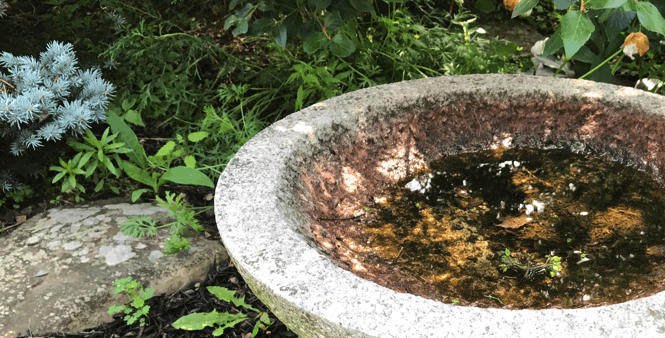Before you pull out chemical solutions, consider prevention and less toxic methods of controlling mosquitos. Here are some ways to reduce mosquito breeding in your yard and prevent mosquito bites.
Eliminate Breeding Sites
Mosquitoes breed in standing water–even in small puddles, in containers around your yard, in ornamental pools and aquatic gardens, and under air conditioning units. Some mosquitoes needs only a bottle cap of water to breed. Since many types of mosquitoes do not travel far from where they hatch, getting rid of mosquito breeding sites can reduce the number of mosquitoes in the surrounding area.
- Get rid of standing water and regularly empty containers that collect water such as toys, buckets, birdbaths, swimming pool covers, or debris such as old tires.
- Drill holes in the bottom of recycling bins, swing tires and other outside containers.
- Clean out rain gutters and make sure they drain properly.
- Repair leaky pipes and outside faucets.
- Turn garbage can covers right side up.
- Fill holes or depressions in trees with sand or mortar, or drain after each rain.
- Stock ornamental ponds with mosquito-eating fish, like mosquitofish, fathead minnows, killifish, and bluegill.
Avoid the Bite
- Wear protective clothing outside when mosquitoes are most active, especially in the early morning and evening. Wear a hat and long sleeves, and tuck pants into socks—especially in highly infested areas. Wear light colors.
- Mosquitoes are weak flyers. Set up fans for home barbeques or other outdoor gatherings.
- Replace or repair holes in window and door screening.
- Use caution, especially when choosing a product for children or when using it in combination with other chemicals or medications. (Always use caution with, or avoid, products that contain DEET. It should not be used on infants or children. In 1998, EPA made it illegal for any product containing DEET to make child safety claims.)
- Use mosquito repellents according to directions.
- Once indoors, wash off repellents with soap and water.
These non-toxic mosquito repellents are safer than DEET: products containing geraniol (MosquitoSafe), citronella (Natrapel), a combination of soybean, and coconut oils (Bite Blocker), or other all essential oils (All Terrain) and reapply often. Picaridin, which is derived from pepper, is a repellent that provides protection comparable to DEET products. Try different repellents to find the one that works for you.
Resources:
The Truth About Mosquitoes, Pesticides and West Nile virus: A Beyond Pesticides Fact Sheet
How to Repel Mosquitoes Safely
Excerpt (and edited) from Public Health Mosquito Management Strategy For Decision Makers and Communities.


Recently on Twitter